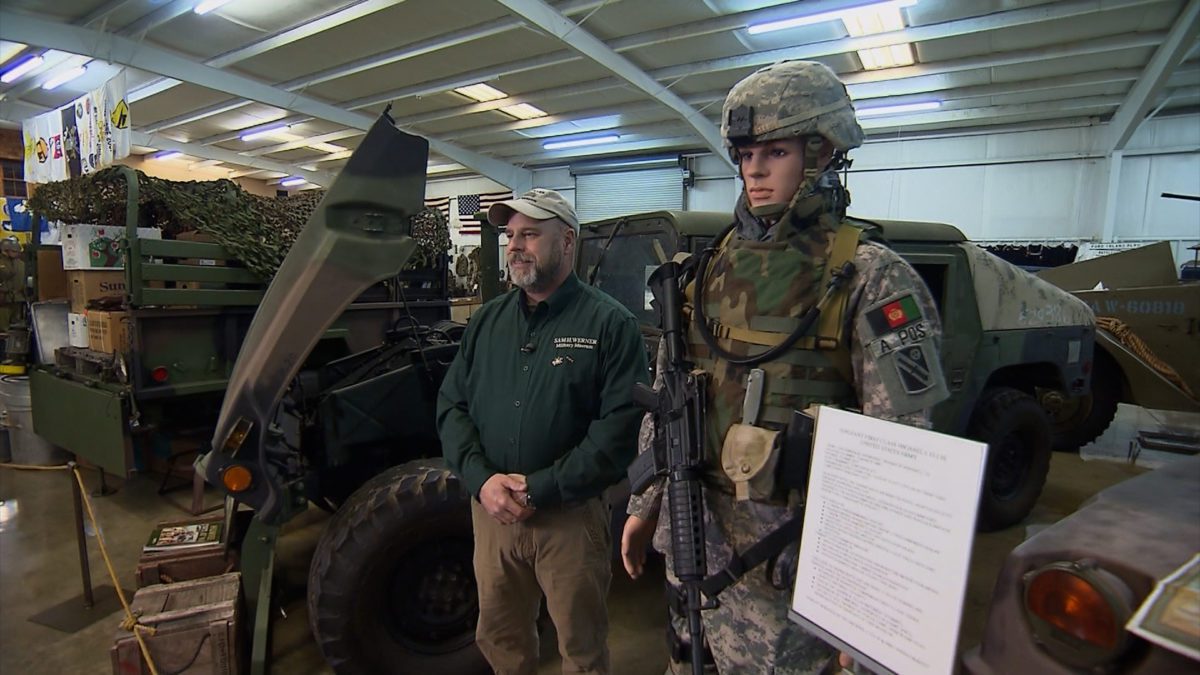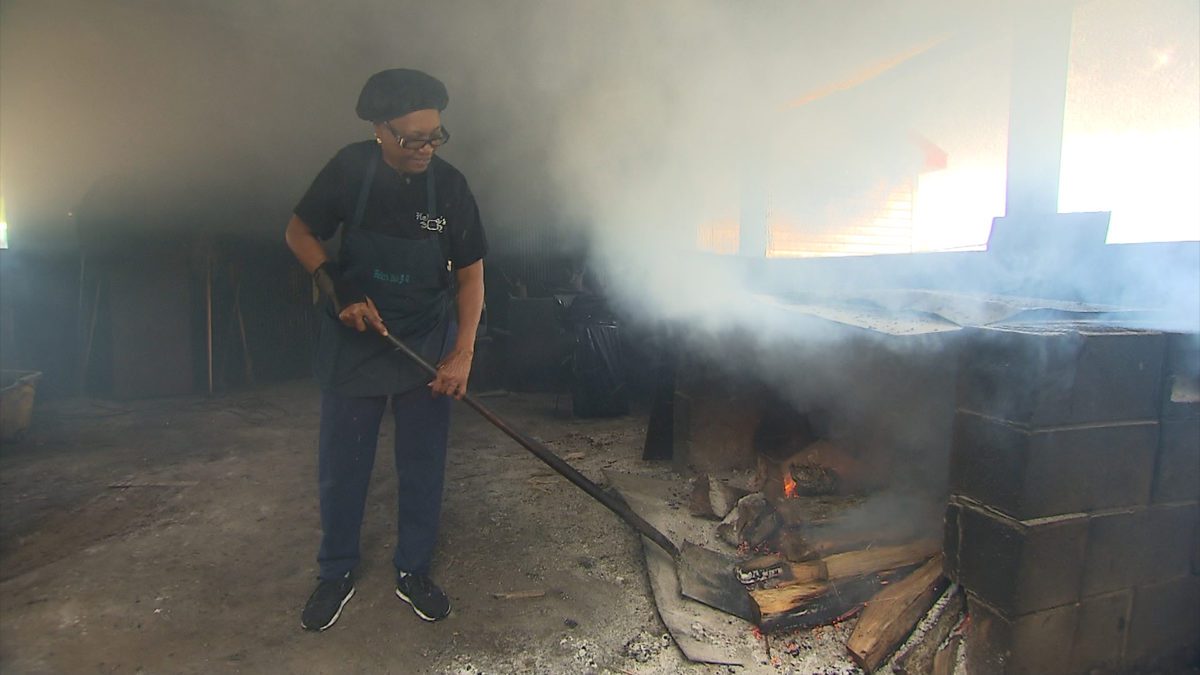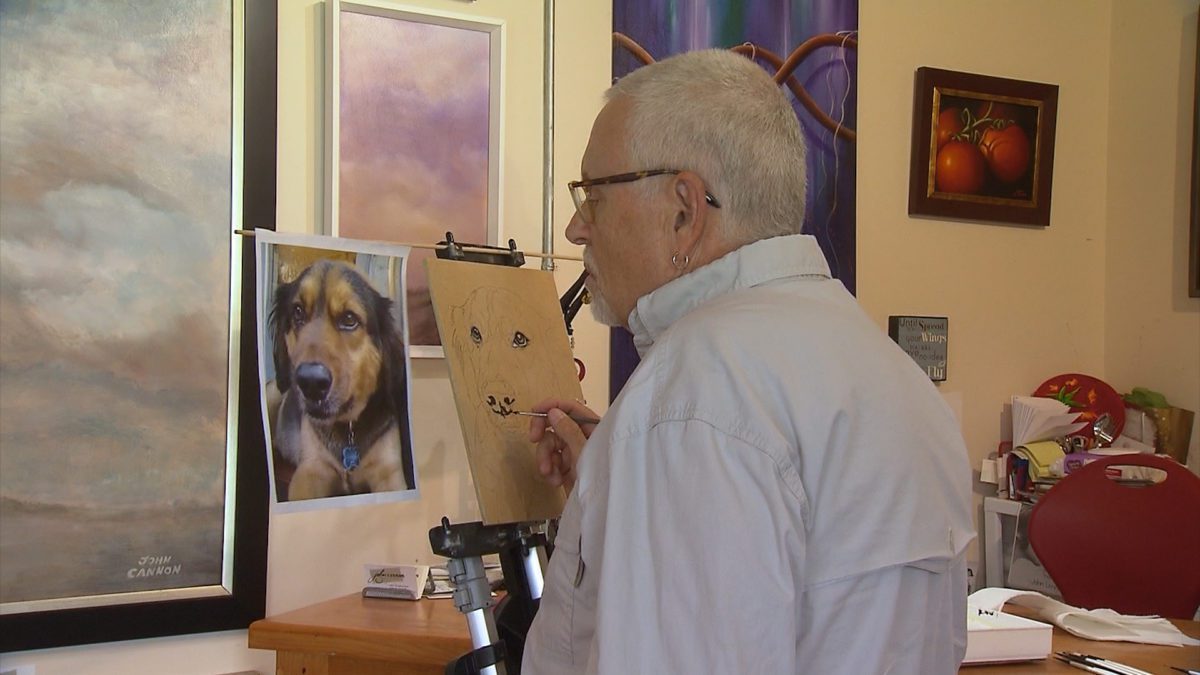Episode 3712
Don't have the PBS App? Click Here
Episode Transcript
- [Narrator] "Tennessee Crossroads" is made possible in part by. - [Phil] I'm Tennessee Tech President Phil Oldham. Here in Cookeville, Tennessee's college town, we are bold, fearless, confident, and kind. Tech prepares students for careers by making everyone's experience personal. We call that living wings up. Learn more at tntech.edu. - ]narrator] Averitt's Tennessee roots run deep. They've been delivering logistics solutions here for over 50 years, and though Averitt's reach now circles the globe, the Volunteer state will always be home. More at Averitt.com. - [Narrator] Discover Tennessee trails and byways. Discover Tennessee's adventure, cuisine, history, and more made in Tennessee experiences showcased among these 16 driving trails. More at TNTrailsAndByways.com. - This time on "Tennessee Crossroads," we'll explore a 50 year old Nashville landmark living up to its donut notoriety. Then visit a Monteagle Museum that's full of military muscle. We'll make a return visit to Helen's famous barbecue in Brownsville. And finally, meet a Nashville artist whose favorite subjects are four-legged friends. Welcome, friends, I'm Joe Elmore. This is another edition of "Tennessee Crossroads." For 50 years, Fox's Donut Den in Green Hills has been serving up happiness with its classic donuts and other baked goods, all under that vintage neon sign. And as Laura Faber tells us, generations of Nashvillians have satisfied their sweet tooth at Fox's. - [Laura] When you are one of the oldest, most popular, and well-loved donut shops in Nashville, something is always cooking in the kitchen. - Another thing we look for is, I call them healthy wrinkles, so like, it's like smooth right now. It's not what you really want, but when you bring it in like this, you get what I call healthy wrinkles. - [Laura] Dough being prepped, rolled, and cut, racks and racks of fresh donuts. - Well, this is Fox's Donut Den. We like to say that we are selling happiness. We have generations of people who have been coming in here. They came in as little kids, they're bringing their kids in now. Everybody's always happy to have donuts. - We're just kind of an old fashioned donut shop. There are two main kind of donuts. You have yeast type donuts that rise, and they're full of air. You have cake donuts that are crumbly, and we make several types of both kinds. - [Laura] Norman and his son Ted are just two of the Foxes of Fox's Donut Den. Norman is a biology teacher turned baker and businessman. He bought a donut franchise way back when he was in grad school, and opened in 1973. - I've taught at Lipscomb. My kids and family went to Lipscomb. We've had a lot of Lipscomb people since, but we went across the street and opened a donut shop, and were there about four years, then moved to Green Hills, higher traffic location, been here since '77. There's 4,000 cars a day there, pushing 40,000 cars a day here, so it's just a higher traffic location. - [Laura] You just celebrated an anniversary. - Yeah, 50 years. We're too dumb to quit. - Good morning, the Donut Den. - [Laura] There is a line for donuts more often than not. Nashvillians of all ages have satisfied their sweet tooth here, from the very young to the more experienced. Some of these men, dubbed the Donut Den Social Club, have been meeting here daily for 40 years. - Norman is an enormously accommodating host. He makes us feel very comfortable here, and he joins in. He sits with us a lot and talks to us, and he's a Vandy fan, and we're all Vandy fans. - [Laura] Not everyone's a Vandy fan? - No ma'am, when they said that a minute ago, in fact, they don't even like me coming in here with my orange shirt. Sometimes they run me out. - Tradition, location, I mean, it's a perfect location for a morning spot. Been here long enough to have its own momentum. - [Laura] Not much has changed in half a century, and that's just the way customers like it. - [Norman] What you see Tyler doing is one of the most important parts about it. It's real subtle. If this dough is not relaxed to the exact right amount, these are gonna come out too small, or if they're over relaxed, then they're gonna deflate and fall apart. It takes us anywhere from six months to a year to train somebody to do that. - [Laura] The result, a classic, perfect donut. - [Norman] We also have resisted going automated. We still train each cook how to do it by hand, so that you get a perfect donut with all the variables perfectly done, which a machine can't provide, so it's a lot more work to train people and to keep staff. - [Laura] Hillsborough Road also would not be the same without the Den's classic neon sign. Years ago when the property owner was making some upgrades, the sign was removed. The public protested. It was put to a vote, and the sign was put back. - [Norman] Where would you go that a community cares about your neon sign, you know? I mean, that kind of stuff just doesn't happen. - You can get fancy at Fox's Donut Den with custard filled, maple covered, sprinkles, but sometimes you can't go wrong with a classic apple fritter or a plain glazed donut, probably the top two sellers here. - [Norman] And we like to form up the edges into like a little bowl almost. - [Laura] The fritters are often called the best in the world. - [Norman] I like to spin them a little, because sometimes they attach to each other. - [Laura] The kolaches sausage and chicken biscuits also sell out, and there are some trends that aren't going away, like the cronut and the maple bacon donut. But trendy isn't what packs 'em in every morning at the Donut Den. - [Norman] They're gonna experience the best handmade donuts that you can find anywhere around. I say that with full confidence. We work very, very, very hard to keep the old school donut process alive, made by hand, top ingredients, and they're gonna experience a lot of smiles, employees that care, employees that have been here, you know, a long time. - [Laura] Norman's goal with the shop was to save enough money for a down payment on a house. He's done that and more. - [Norman] Didn't intend to stay in business this long. It's just has done well and come along. All our kids have worked here. It's been a real family business, actually. - [Laura] Fox's Donut Den has impacted an entire city with some dough, a bit of glaze, and sprinkles on top. - Thanks, Laura. Are you a history buff? How about military history? Well, in our next story, Miranda Cohen's gonna take us to a museum in Monteagle, where you can explore stories and equipment used by the Armed Forces of our country. - [Miranda] Monteagle Mountain has a rich military history, so it seems quite fitting that a rare collection a century in the making is being preserved and displayed here at the Sam H. Werner Military Museum on West Main Street, carefully looked after by his longtime friend, Parker Lowndes. - Sam Werner, of course, everybody here locally knew him as Bud, was a gentleman who served in Korea. His family was from here on top of the mountain in middle Tennessee, in the Tracy City, Monteagle area. When he came back, he started collecting a variety of different surplus and military items, and he had a very unique eye for the odd things. He found one-offs or very rare items to add to his private collection. These things came out of old bread trucks. They came out of people's drawers. They came out of chicken coops. They came out of literally every nook and cranny. - [Miranda] Werner's love of collecting military mementos grew so large that when he passed away, it was his final wish that his beloved artifacts be preserved and presented in a way others could appreciate them as a tangible reminder of the sacrifices that were made, and of the people who made them. - Serving in the military, you're doing something bigger than you. It's not for a paycheck, it's not for an education. This is preserving history. This is preserving somebody's legacy or somebody's service to the country. - Michael Ellis is a third generation military man, 24 years in active duty, and he was deployed all over the world. As we walk through this impressive display of authentically dressed mannequins, where each one depicts a local member of the community, we find someone familiar. So Mike, every mannequin back here represents a real person? - Yes. - This guy look familiar? - That's a likeness of me, except he's just a little taller. This is a period correct for 2005, when I was in this uniform and getting deployed to Afghanistan. This is the 196 Field Artillery Brigade out of Chattanooga, Tennessee. This is a blood type, and this is the Afghan national flag. As we walk through, look through the displays and look through the mannequins, we're trying to bring that person's lives back to share as they wanted them shared. - [Miranda] The volunteers and staff at the Sam H. Werner Military Museum have gone to great lengths to recreate each authentic scene from a day in the life of a soldier. From the mess hall to the medicine tent, men and women from all branches of the service are represented, the unsung heroes from World War I all the way up to Desert Storm. - [Mike] There's so much history in each one of these different decades, in each one of the conflicts that are represented through this. - [Miranda] Representations of people who did their jobs, protected our freedom, came back to Tennessee, and quietly went back to work. - A lot of these men and women went off and served, and then they come back, and they really never talked about it. They just melt back into our society. - [Miranda] Thanks to donations of relics and heirlooms from service families around the country, the Sam H. Werner Collection is both massive and impressive, pristine uniforms, tents, soft goods, and a stunning rare collection of military vehicles. - [Mike] The thing that makes this museum special are the four 1943 ultralight prototype Jeeps that were set up for the Glider program, and we're the only museum that has that complete collection of all four. In World War II, they were looking at ways to take vehicles and men from England across the channel over to into the battlefields. They had to be 1,300 pounds or less, air cooled engines, carry at least two men, and be four wheel drive. - [Miranda] Thanks to constant care and maintenance from a dedicated staff, about 70% of these vehicles are still operational, and will occasionally drive a long-time friend down memory lane. - To bring them back to life, hear 'em run, and actually ride down the road in 'em is meaningful. To put one of those guys in one of these War II vehicles and drive 'em in a parade, you ought see their face. It's just unreal the experience that that is. And they can tell you, "Boys, we rode in this thing, you know, going through France or going through Germany," or whatever, and they'll tell us a story about it. - [Miranda] The Sam H. Werner Military Museum is free and open to the public, including group tours. The real value to the staff is to be able to preserve the legacy of Sam Werner, and to share these moments of history with others, with all of its glory, honor, and loss. - [Mike] We honor everything that people want to bring to us. I think he'd be very proud of it. Sam was a very patriotic gentleman. He enjoyed collecting, so I think that having all of this under one good dry roof that you can walk through and enjoy and see the history, I think he'd be very proud of. - Many thanks, Miranda. It's heartening to learn about the success of a business we've previously featured on "Tennessee Crossroads." Well, such is the case of Helen's Barbecue over in Brownsville. This unassuming little place in west Tennessee has earned an international reputation. The secret has to do with change, or as you're about to see, the lack of it. A few miles north of Interstate 40, Brownsville is the county seat of Haywood County. In addition to its quaint, historic public square, there are other attractions here that make the town worthy of a stop, such as the West Tennessee Delta Heritage Center with a museum celebrating everything from cotton to regional music, not to mention the childhood schoolhouse of the queen of rock and roll, Tina Turner. Then there's this curious attraction. What is it? Well, it's called the Mindfield, a structure that began in 1989 by local artist Billy Tripp. It's a collection of steel parts and pieces, all painted battleship gray, strange, yes, but quite a unique and fascinating site for sure. There's one Brownsville attraction that not only has fans all over the state, it's got a worldwide fan base. I'm talking about Helen's famous barbecue. You might remember seeing Helen Turner's place back in 2008 in a "Tennessee Crossroads" barbecue special called Smoking. Well, on this recent trip, I discovered not much has changed at Helen's Barbecue, that is, if you don't count her national attention and celebrity status in the world of barbecue. - Well, I wouldn't say a celebrity, but I've been on quite a few shows and quite a few magazines. The first magazine I made was "Savoy Magazine" out of New York. - [Joe] Her cooking methods haven't changed. For here, it's all about time-tested simplicity. - I don't see any secret in it. I don't, you know, I don't put any seasoning on the meat. I just make my fire, let the wood burn down, put them shoulders on the pit, and just put the fire under the shoulders, and just let 'em cook all day long. - [Joe] And her sauce gets kudos from food critics and fans alike. - You know, I make it myself, and everybody loves it, and I sell a lot of it. Matter of fact, I got somebody that'll be here in a few minutes for a gallon of mild and a quart of hot. Everything in here is homemade. Peel those potatoes, cook 'em, and make my own potato salad. Grate up my cabbage, make my own slaw. And well, you know, I buy those big gallon can of pork and beans, but I add all my season to that. Tell your husband I said hi, he all right? - [Customer] Yeah, he's doing good. - [Joe] Helen just may be the only female barbecue cook and proprietor in the state, although she never stops to relish the distinction. - [Helen] Well, they tell me I'm pretty much the only female that cook with wood, hickory and oak. - [Joe] You use hickory and oak, right? - Well, I mix it, because, you know, the hickory gets hot, well, really hot, so I mix the wood to, you know, to tone it down some. - [Joe] Where there's wood and fire, there's smoke, lots of smoke. You have to wonder, how does she endure it? - Dude, smoke have me crying. I've been crying ever since I've been cooking. See what it's doing to me? I don't care how long I've been doing this, it still make me cry. - I just walked through there, and I'm crying. Helen thought about retiring after 25 plus years of hard work in the pit and kitchen, but fortunately, she changed her mind when her husband Leonard came on board. - And my husband helps out a lot now since he retired. He's been retired now for a year, but him helping me out is wonderful. - Hot sauce, chips? - Yes, sir. - 25.26. - [Joe] Since the COVID pandemic, Helen's Barbecue has been carry-out only, and business has been brisk. Now with so many regulars from the surrounding area, well, Helen knows what many will order as soon as they show up. - Thank you, sir. - Some of 'em do, and sometime I tell 'em, "Look, I'm getting old now, y'all gotta help me out." - So anytime I'm in close to the area, I always come to Helen's. So she does a great job. Her sauce is very unique, and we really like her product. - Over the years, Helen has filled several notebooks full of signatures and comments from happy customers, literally from all over the world. I already love you, Helen. Guy from Denmark, or a lady from Denmark. This is what truly keeps Helen Turner going. Not so much the money or the notoriety, it's the joy of pleasing people with some of the best barbecue in the South, and making new friends from places near and far. - All right, good to see you, thank you. - You know, it give me the thrill, 'cause I get to meet a lot of different people, and I enjoy that. - What you been up to? - [Customer] Oh, wait, can I get a rib? - Whoever said you can't buy love never bought a dog. Doesn't take long for a canine companion to become a cherished member of the family that you'll never forget. Cindy Carter met an actual artist who immortalizes our four-legged friends on canvas. - [Jo] Then all I gotta do is give him a pat. - [Cindy] Buddy is one lovable mutt with a crooked smile and a laid back. - [Jo] He's just always looking to be petted or looking to be fed. - [Cindy] Real laid back disposition. - [Jo] He's easy, this is all he does. - [Cindy] And Buddy's owner, Jo Jorian, thinks her one of a kind dog deserves a colorful tribute to his uniqueness. - [Jo] He's not fancy, so I don't expect it to be fancy. He's an East Nashville little mutt dog that we love, so I think he'll capture that. - [Cindy] Fine artist John Cannon is tasked with capturing Buddy's loving, gentle spirit. - [John] One of the things that it took me a long time to get to really be able to see is how many colors are in their eyes. - [Cindy] Every day, John lives the artist life inside his East Nashville studio, if you will, his own little doghouse, where he specializes in pet portraits. Since pets are hard to pose, John's work begins with a photograph. - [John] The challenge is to make my painting look better than the photograph. Sometimes it's more challenging when it's a good photograph, 'cause then I have to really work to make the painting look better than. - [Cindy] John's passion for painting is deep rooted, though he did get sidetracked for 25 years by his successful law practice. His mind may have been on the case at hand, but his hands were often otherwise engaged. - [John] Oh, I doodle constantly. - A few years ago, he got inspired, and he got serious. John finally exchanged his legal briefs for brush strokes. Now, John's work isn't limited to pet portraits. He also paints people, and landscapes, and plenty of those East Nashville tomato art festival tomatoes. Still, he says he has a special place in his heart for his pups, as he likes to call them. - And so what I try to do, I try to really capture the essence of the subject. whatever it is, so that the painting gives the people a permanent reminder of their friend. - [Cindy] And a permanent reminder of Buddy is exactly what John's client Jo Jorian wants, but not for herself. - [Jo] Do you wanna give him a treat? Here, Jacob. - [Cindy] 18 month old Jacob lives next door to Jo, and Buddy. - Jacob, do you wanna give him a treat? - [Cindy] Is Jacob's best friend. - Here you go. You wanna give it to Buddy? Yeah. - [Cindy] But little Jacob and his family are moving soon. John's portrait of Buddy is one way Jo hopes this special bond can last forever. - And so that's our going away present for Jacob to put in his room so when they move, they can take a little bit of Nashville with 'em to Brentwood. Yeah, more? - [Cindy] It's this emotional connection between pals John tries to capture, and with Buddy, as with most of his portraits, John says it's all in the eyes. - [John] One thing I really, I've spent a long time trying to really be sure I can see their eyes well, and once I kind of see what's in their eyes, I can paint the pet. - [Cindy] And when his work is done, John can tell almost immediately if he's succeeded. - [John] Numerous cries, numerous tears flow from giving them the painting. A lot of times it's joy. - [Cindy] Tears and joy John also experiences, knowing his work keeps friendships alive in so many hearts, the type of impact he is grateful for. - [John] There is a part of me in every painting. It's not a technical thing per se, it's an emotional thing. - [Cindy] Every painting presents a new and unique challenge. - And I hope it says that I have the ability to emotionally relate to the pets. and ultimately, to the people who love the pets. - [Cindy] But with each stroke, John hopes his fine art makes people feel like the subject is just about to bark at them, or in Buddy's case, flash a crooked smile. - Well, that's gonna have to do it for this edition of "Tennessee Crossroads." Thanks for joining us. Hey, don't forget about our website, TennesseeCrossroads.org, and while you're there, download that PBS app so you can watch your favorite shows remotely, and don't forget about our show next week. I'll see you then. - [Narrator] "Tennessee Crossroads" is made possible in part by. - [Phil] I'm Tennessee Tech president Phil Oldham. Here in Cookeville, Tennessee's college town, we are bold, fearless, confident, and kind. Tech prepares students for careers by making everyone's experience personal. We call that living wings up. Learn more at tntech.edu. - [Narrator] Averitt's Tennessee roots run deep. They've been delivering logistics solutions here for over 50 years, and though Averitt's reach now circles the globe, the Volunteer state will always be home. More at Averitt.com. - [Narrator] Discover Tennessee trails and byways. Discover Tennessee's adventure, cuisine, history, and more made in Tennessee experiences showcased among these 16 driving trails. More at TNTrailsAndByways.com.
Tennessee Crossroads
October 05, 2023
Season 37 | Episode 12
Laura Faber explores a 50-year-old Nashville landmark living up to is donut notoriety. Miranda Cohen visits a Monteagle museum that’s full of military muscle. Joe Elmore makes a return visit to Helen’s famous BBQ in Brownsville. And Cindy Carter meets a Nashville artist whose favorite subjects are four-legged friends.




